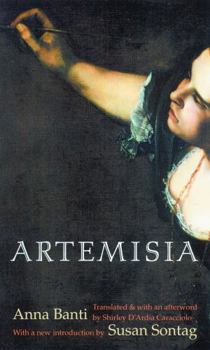Artemisia
Select Format
Select Condition 
Book Overview
Artemisia Gentileschi, born in 1598, the daughter of an esteemed painter, taught art in Naples and painted the great women of Roman and biblical history. She could neither read nor write, and she was the reviled victim in a public rape trial, rejected by her father, and later abandoned by her husband. Nevertheless, she was one of the first women in modern times to uphold through her work and deeds the right of women to pursue careers compatible with...
Format:Paperback
Language:English
ISBN:0803262132
ISBN13:9780803262133
Release Date:December 2003
Publisher:Bison Books
Length:224 Pages
Weight:0.30 lbs.
Dimensions:0.5" x 5.5" x 8.5"
Customer Reviews
4 ratings
Author and 17th century artist speak together across time
Published by Thriftbooks.com User , 21 years ago
Anna Banti's first draft of this work of love and devotion was destroyed in WWII. It concerns Italian painter Artemisia Bentileschi. While few concrete facts are known about her, she has fascinated art historians for centuries. Anna Banti, when she began writing her manuscript for the 2nd time, was influenced by her own experiences, and she elected to challenge the boundaries of traditional biography. Artemisia is fleshed out. Neither true biography (obvious, given the paucity of facts) nor historical fiction, Artemisia dives into spurts of detail to capture the feelings and images of `truth,' rather than to pin down verifiable `facts.' Such is the new genre: creative nonfiction, tho Banti definitely and admittedly takes liberties. Truth With Privileges would be a good description.Artemisia is a rich, complex, and extremely thought-provoking book that demands the reader's careful attention.Spectacular, but challenging.
An Absolute Triumph
Published by Thriftbooks.com User , 22 years ago
Atemisia Gentileschi, born in Rome in 1598, is one of the most fascinating figures in the history of art, though very little is known about her life. The daughter of a painter herself, Artemisia painted beautiful scenes of the women of Roman and biblical history even though she could neither read nor write.Artemisia had, to put it mildly, a turbulent personal life. She was discredited in a rape trial, betrayed by her own father and abandoned by her husband. Her professional life, however, was far different. She was the first woman admitted to the prestigious Florentine Academy; she established a successful art school in Naples; she raised her daughter on her own and supported herself financially during a time when a woman's life was defined only by home, husband, children and the Church.Although the above is about the sum total of all that's known about Artemisia Gentileschi's life, writer, Anna Banti, managed to flesh out these bare bones facts into one of the triumphs of 20th century Italian literature."Artemisia" is definitely not a biography or even a fictionalized one. It is not a historical work; in fact, the setting of this book is definitely ahistorical. It consists of an amazing dialogue between the author and Artemisia. There are, as way I see it, three levels in this book: the experiences of Artemisia, the experiences of the author and a blending of the two, to make a very fascinating third.The very essence of this book consists of Artemisia's travels, all made for the sake of her art. Included are the young Artemisia's traumatic experiences in Rome, her marriage, her years of success in Naples, her long and undoubtedly arduous journey to England and back again to her native Italy.One of the things that makes this book so powerful is Banti's constant authorial intrusion, a device that would weaken (or destroy) more conventional novels. Moving back and forth from the thrid to the first person, Banti holds fascinating conversations with Artemisia. This leads to a captivating, but very complex, narrative. As the dialogue between author and subject intensifies, Banti complicates matters even further.In 1944, when the first version of "Artemisia" was nearly complete, events of the war caused it to be destroyed. The "Artemisia" of the first version constantly intrudes on the "Artemisia" of the second version, however. Confusing? No, not really. Banti is far too good a writer for that. Complex? Yes. And lyrical and skillful and fragile.Despite the fact that this is not a historical novel, it is highly atmospheric. There are no detailed descriptions to weigh down the weightless quality of Banti's lyricism, but there are many vivid images of 17th century Rome, Naples, Florence, France.No matter how fast you usually read, "Artemisia" is a novel that should be read slowly. This is a demanding book that requires much concentration on the part of the reader, but this concentration will be richly rewarded.There is a vague, circu
The best of the fictional vesions of Artemisia
Published by Thriftbooks.com User , 24 years ago
This is an extremely well-written and moving account of Artemisia. It is a modernist novel and is a dialogue between the the narrator and Artemisia. I highly recomend it.
art meets history
Published by Thriftbooks.com User , 24 years ago
This is a haunting tale of a woman painter on the skirts of history. Anna Banti intertwines not only fiction with history, but also past and present and her own life with that of Artemesia. The story encompases a number of years and is written in a stream of conscious manner. It is not fully understood until the end. The reader becomes wraped up in the mystery that the author has created.





